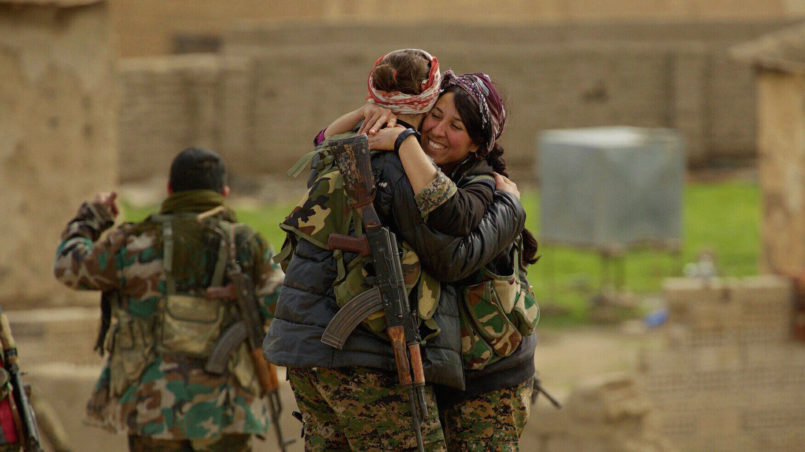A Fight Against Domination

The idea of women as soldiers or warriors in wars or conflicts is not very appealing to many as it destabilises the very notion of women as pacifists and anti-war advocates. And in fact, the relation of women to militarisation occupies a prominent place in the feminist debate on the relationship between equality and difference.
Feminists who espouse pacifism view women’s participation in militarism and thus in war and conflict zones in combat roles as emulating hyper-masculine characters.1 Such women are considered as buying into a militarised male identity and thus become objects of criticism. In the view of such feminists, men and women are essentially different, as men are perpetrators of violence while women are understood as harbingers of peace. Such notions of pacifist feminists are subject to criticism from another group of feminists who argue that women’s agency in war cannot be downplayed, as women have always participated in the war in varying capacities if not in an active combat role.
According to this group of feminists, considering women as incapable of or displaying a strong aversion to violence entrenches gender norms which are based on essentialism and biological determinism. They argue that women’s experiences in war cannot be reduced only to that of victimhood but also needs to recognise women’s roles in a war in military capacities, especially in combat roles. In fact, some feminists consider the incorporation of women in military institutions as an achievement of women’s rights.
Such debates on the role of women in the military and war become alive when we witness an all women brigade in Syria, fighting the Islamic State in Iraq and Syria (ISIS). Media representation of these Kurdish women fighting ISIS and defeating them captured the attention and awe of many, but also attracted criticism from some feminist circles, especially those who espouse pacifism as synonymous with feminism.
My interest in these female fighters led me to delve further into their history of militarisation as well as ideology. These female fighters belong to the female armed wing (YPJ) of the Kurdish Democratic Union Party (PYD) that has established the de facto autonomous administration in Syria. These female fighters claim that Kurdish women have been willingly participating in revolutionary and anti-colonial struggles throughout history, and thus it is important to understand the political significance of their participation in combat roles.
They frame their resistance within the Kurdish Workers’ Party’s (PKK) revolutionary past and claim that their militarisation is rooted in an experience of political struggle against state oppression. However, they claim that now their struggle is not only against state and non-state oppression but also against oppressive patriarchal norms.2 In fact, many female Kurdish fighters link their armed political struggle to gender reform.
According to these female fighters, participation in guerrilla organisations and taking up combat roles is a way to challenge gender boundaries. These female guerillas are seen as setting examples for the importance of female leadership in every sphere of life.3 The militarisation of Kurdish women is framed as a fight against domination through combat against ISIS, the Syrian regime, and the larger Kurdish patriarchal society.4
However, it was interesting to find out that gender parity was applied not only in the armed wings. Gender parity has been applied throughout the Rojava movement. Rojava’s constitution enshrines women’s rights and urges all public institutions to work against gender discrimination. Thus in the Rojava administration, women have active participation at all political and military levels.5
Fifty percent of the offices in Rojava are held by women and, in each city, the concept of co-presidency has been established. Moreover, a women-only police unit (Asayish) has also been formed in the cities of Rojava. Such structures in the political and administrative arena are established based on Abdullah Ocalan‘s philosophy that “the level of women’s freedom determines the level of freedom in society at large“.
However, the militarisation of Kurdish women has attracted criticism from some feminist circles, who argue that women should resist militarisation rather than participate in it.6 However, such criticism has attracted further criticism. These feminist critics argue that the militarisation of Kurdish women has to be seen within a context that is replete with gender-based violence perpetuated by ISIS. So for Kurdish women, militarisation is synonymous with necessary and legitimate self-defense and is by no means related in any way to state militarism, which pacifist feminists have been struggling against.
In spite of the various debates that have arisen as regards Kurdish women’s militarization, it is important to applaud the agency of female Kurdish fighters in a region that is considered the seat of patriarchy. In other Middle Eastern countries, women are still struggling with issues of basic women’s rights. But these Kurdish women have succeeded in setting in motion the process of reformation in gender identity and roles, irrespective of all the constraints that they face as an ethnic minority struggling for self-determination.
The future of these female fighters in a patriarchal society remains uncertain, but for now, they have succeeded in at least challenging the repressive gender norms that have been relegating them in every sphere of life.
_
1 https://www.opendemocracy.net/5050/dilar-dirik/feminist-pacifism-or-passive-ism
2 ebd.
3 https://www.google.co.in/amp/s/mobile.reuters.com/article/amp/idUSKCN0W20F4
4 https://www.opendemocracy.net/5050/dilar-dirik/feminist-pacifism-or-passive-ism
5 https://www.google.co.in/amp/s/mobile.reuters.com/article/amp/idUSKCN0W20F4
6 https://muftah.org/limits-western-feminist-engagement-kurdish-female-fighters/
Credits
| Image | Title | Author | License |
|---|---|---|---|
 |
Kurdish_YPG_Fighters_(16050762203) | Kurdishstruggle | CC BY 2.0 |
